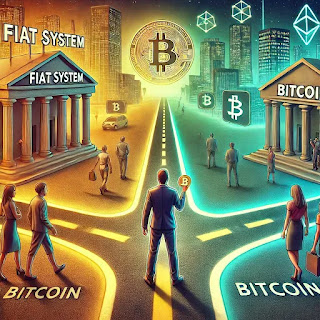Bitcoin as the Blueprint for a Better World
What if Bitcoin isn’t just a new kind of money, but the start of a new kind of world?
Most people think Bitcoin is just about price. Just about investing. Just about getting rich. But they’re missing the signal. Bitcoin is not the end goal, it’s the beginning of something much bigger. It’s a prototype for a world where power is no longer concentrated at the top, but distributed across the network. A world where we stop outsourcing our freedom to middlemen, institutions, and unelected “authorities.”
We live in an age of centralization. Governments print money on a whim. Corporations track our every move and sell our data. A handful of media conglomerates shape the public narrative. Universities gatekeep knowledge. Power is stacked vertically, and we’re told to trust the ones at the top. That structure might have worked in an industrial era, but in the digital age, it’s starting to show deep cracks. Everything is faster, more connected, more interdependent—yet the systems managing our lives are stuck in outdated, rigid hierarchies.
But history tells us this kind of structure always collapses. It’s fragile. It breeds corruption. It disconnects leaders from the people they claim to serve. And worst of all, it strips individuals of their agency. The more centralized a system becomes, the more easily it can be manipulated, captured, and weaponized. It becomes not a protector of people, but a parasite on their productivity.
Then Bitcoin arrived, quietly at first. No leader. No company. No headquarters. Just a whitepaper. A message. A blueprint. It didn’t ask for permission. It didn’t beg for approval. It simply emerged, offering the world an alternative: a decentralized, permissionless, incorruptible system built on rules instead of rulers.
Bitcoin proved something the world desperately needed to see: that humans can coordinate, transact, and build value without trusting a single point of failure. It showed us that distributed consensus isn’t just possible, it’s powerful. It doesn’t just resist corruption, it makes corruption nearly impossible. It’s not perfect, but it’s fair—and in a world that feels increasingly rigged, fairness is revolutionary.
Now imagine taking that model and applying it to everything.
Imagine media that isn’t owned by billionaires or hijacked by government narratives. Instead, it’s peer-to-peer, truth-verified, and censorship-resistant. Imagine education that’s open-source, globally accessible, and immune to bureaucratic decay. Imagine governance that’s transparent, programmable, and accountable. No backroom deals. No unelected middlemen. Imagine public utilities that are run by communities, not corporations. Imagine digital identities that you own and control—not some database vulnerable to hacks, leaks, or political abuse.
Energy grids. Identity systems. Communication platforms. Even social networks. All of them can be reimagined through the lens of decentralization. Bitcoin showed us how to build a trustless network secured by math and incentive alignment. That same model can liberate countless systems currently shackled by hierarchy and control. It opens the door to a future where power is earned—not inherited or imposed.
This isn’t about anarchism. It’s about antifragility. It’s about moving from systems that break under pressure to systems that grow stronger because of it. It’s about building networks that are resilient, transparent, and deeply human. Not ruled by kings or presidents or CEOs, but coordinated by code, consensus, and community. It’s about dignity. It’s about ownership. It’s about the right to exist without asking for permission.
The centralized world is cracking. It’s unsustainable. But something new is emerging. A world where people are no longer subjects, they’re sovereign. Where you don’t need permission to participate, to innovate, or to speak. Where the rules are clear, and the playing field is level. A world where the network is the institution—and everyone has a seat at the table.
Bitcoin didn’t just give us sound money. It gave us a new mental model. A spark. A glimpse at what’s possible when we stop asking for change and start building it. It’s the seed of a broader transformation—one that extends far beyond finance and into the foundations of society itself.
This is bigger than currency. This is about the architecture of the future. It’s about rebuilding trust without trusting any single person. It’s about choosing cooperation over coercion, code over corruption, and freedom over fear.
The revolution isn’t coming. It’s already here.
Tick tock. Next block.




Comments
Post a Comment